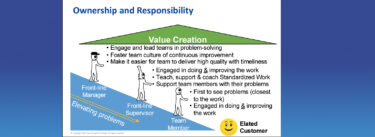Is Lean Mean?
Recently I had lunch with an old colleague from MIT I hadn’t seen in a while. His first question was, “What new ideas are you working on? Surely you’re way beyond ‘lean’ by now.” That question was just what I expected from a professor, whose life is a quest for the next new idea. Since our work at LEI is about deploying useful ideas that are already familiar (rather than just talking about them), I let that one pass.
But the next question demanded an answer. “How can you advocate ideas that improve efficiency but destroy jobs? What the world needs now is more work, not just more productivity.” In other words, “Lean is mean.”
That one got me mad. As I look at the world, we have an enormous surplus of muda in every industry and human activity. At the same time, we have an enormous shortage of resources to deal with issues ranging from global security and climate change, to AIDS and living standards in the developing countries, to healthcare for aging populations in the developed countries. Our challenge is to convert the waste required to perform many current activities into new capacity to perform needed activities. So lean thinking must be a big part of the solution. By itself, lean can’t be mean.
Problems can only arise from the way lean is used. I frequently encounter firms whose lean implementation is totally negative: “We’ll take lots of people out of this process and more people out of that process and maybe we will be able to survive for a while in our highly competitive, mature industry.” They simply have no plan for growth, using the resources freed up. But standing still can never be a successful strategy for a company and its employees.
At the same time, governments seem to have little interest in helping people transfer to new activities when muda is removed from mature industries. We at LEI never receive inquiries from governments about how more people can be taught lean concepts so they can find useful roles in new industries. And we rarely receive inquiries from the mature education industry – the technical schools and universities largely funded by governments – about how everyone can be exposed to lean thinking.
So instead of thinking about new uses for human effort, the political process mostly thinks negatively about how to preserve the present, with trade barriers being the easiest option. But to repeat: Standing still can never be a successful strategy for a country, any more than for a company.
My own feeling is that we in the lean movement haven’t made our voices heard about the need for help in moving people to new activities and for training everyone to be a process-focused, lean thinker. I would be very interested in hearing from the Lean Community about how we can take steps to at least insure that every employee (and student) everywhere understands lean thinking. This is the best way to be sure that lean is never mean.
Best regards,
Jim
Jim Womack
President and Founder
Lean Enterprise Institute






